#siege of arras
Text
Cyrano, tending to De Guiche's wounds: How would you rate your pain?
De Guiche: Zero stars. Would NOT recommend.
#incorrect cyrano quotes#cyrano de bergerac#the aftermath of the Arras siege#let's pretend for a moment that nobody died
1 note
·
View note
Text
Ladies and gentlemen, it’s official! I’m writing a musical!
For those of you in the community who have known me for a while, this is nothing new, but I’ve been working on it for quite awhile, so I finally want to unveil what I have so far.
The show is officially called “Tyrant! The Story of Robespierre” or just “Tyrant!” for short, and here’s my first concept for the album cover below!
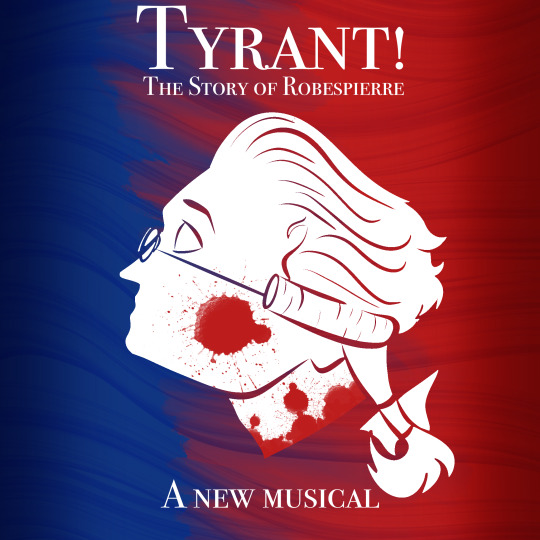
As for the actual story and songs, right now I’m planning on having 16 songs per act, and I’ll format the songs I’ve written or am currently in the process of writing!
Italic = work in progress
Bold = fully written
With that being said, this is the song catalogue and all I’ve gotten done so far!
Act 1:
Tyrant! (Show opener) - immediately after his death
Address for the King - early childhood
Never shall we part - transition from childhood to adulthood, meets Camille
Song addressed to Miss Henriette - young adulthood
And So I Reminisce - trio song for the siblings
He Just Can’t Stop - lawyer career in Arras
Let Us Speak/We Swear - Estates general + tennis court oath
Camille’s Address (Bring It Down) - Storming of the bastille
Hey Ladies! (Theroigne’s song + Women’s March on Versailles)
Bienvenue aux Jacobins - Joins the Jacobin club and meets Danton, gets elected president of the club
Never shall we part (1st reprise) - Camille’s marriage to Lucile
Escape (Louis + Marie flee Paris, Champ de Mars massacre)
There’s Safety Here (Robespierre meets Maurice Duplay, moves into the Duplay house)
This Means War! (Speeches against the war and Brissotins, war gets declared anyways)
The Tuileries Tango (Storming of the Tuileries and overthrow of the monarchy)
Liberté, Egalité, Fraternité For All (Establishment of the republic, Robespierre at his height, his big “I want” song)
Act 2:
Incorruptible (Saint-Just’s debut and Robespierre’s election to the National convention)
So Ends the Reign of Tyranny (Louis’ trial and execution)
Bienvenue aux committee/ Bienvenue le Jacobins (reprise) (Appointment to the CPS)
Choose Your Side/And So I Reminisce (reprise) (Charlotte and Augustine’s fight, fracture in the family, duet with Élèonore, PLATONIC, NOT ROMANTIC)
Principio Ad Finem/ A late night’s walk (“darker” ‘I want’ song, NOT A VILLAIN SONG )
What is he doing? (Camille publishes his paper and says stupid stuff)
Never Shall We Part (2nd and 3rd reprises) (Max and SJ duet, Camille’s denouncement from friends to enemies)
A Meeting/Make Him a Monster (CPS meeting, Thermidorian villain song)
You’re Unwell (Eleonore and SJ duet, Max falls ill/ slowly loosing his sanity)
So Ends the Reign of Tyranny/ Liberté, Egalité, Fraternité for All (reprise) (Arrests and executions of Camille, Danton and their followers, closest thing to a villain song for Robespierre)
This Glorious Day (Festival of the Supreme Being, more Thermidorian conspiring)
Principio Ad Finem (reprise) (Max writes his 8 Thermidor speech)
My Final Bow (8 Thermidor speeches for the convention and the Jacobins)
We Swear/Let Me Speak! (9 Thermidor denouncement and arrest)
Requiem (Hotel De Ville siege, bullet to the jaw, death, 11th hour power ballad)
May You Ne’er Be Forgotten (basically charlotte’s ‘who lives who dies who tells your story’, her 11th hour power ballad, grand finale of the show)
I know that was a lot thrown at y’all, and obviously I’ve still got a long ways to go, but I’ll be working hard at it all summer, and I hope to have at least half of the first act finished by the end of this summer! I’ll keep working on asks too now that my schedule’s freed up, but I thought it’d be a fun announcement to share with all of you for Max’s birthday, and I can’t wait for you to see the rest of it! Love you all! ❤️❤️❤️
-Syd
295 notes
·
View notes
Text
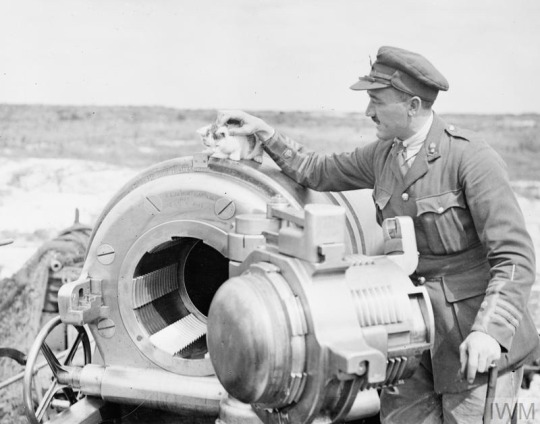
The breach of a 12 inch howitzer, right hand section, 444th Siege Battery, Royal Garrison Artillery, near Arras 19 July 1918. Note a kitten on the top of the howitzer.
6 notes
·
View notes
Text
Theory: Speculating about Volume 10 through Joan of Arc references. Part 2: New land, old enemies
Hello, this is continuation to my previous Volume 10 theory (linked below)
Speculations will be done mostly through Joan of Arc references, meaning they will be very Jaune-centric. Speculations will also imply that every major event in Joan of Arc's story will have RWBY equivalent, which is very optimistic assumption. But hey, I'll shoot at the wall and see what sticks.
As usual, I'll also link my Joan of Arc timeline theory for anyone interested in my full reasoning. This theory will be relatively straightforward and focus on my so called Timeline 1. Either way, I'll give quick tl;dr if something from that theory pops up.
With all that out the way, let me begin this theory.
TYRIAN AS MAIN THREAT
Last time we saw Tyrian, he was being sent together with Mercury to Vacuo. I'd say it's safe to assume he will be major antagonist of early Vacuo portion of the story (Cinder and potentially Salem being saved for later). Otherwise, what was the point of him being sent away relatively early to Vacuo when siege of Atlas wasn't even finished. Salem probably has major plans for Vacuo she wants to accomplish through him (especially since Vacuo was suppose to be sooner than Atlas). In my previous theory I speculated Crown faction from RWBY novels will be antagonists of this portion of the story as well. If that's the case, Tyrian was likely sent to establish the contact with them.
Tyrian also makes sense as an antagonist if you think some plot threads of previous volumes are being repeated. Volumes 7 and 8 have decent amount of parallels to Volumes 1-3, especially endings of Volume 3 and 8. If that's the case, then Tyrian makes sense as antagonist considering his first appearance and major antagonistic role was in Volume 4. Theoretical Volume 11 would then likely repeat some threads from Volume 5.
However, this is primarily Joan of Arc based theory, so let me get to that. After relatively unsuccessful campaign against Perrinet Gressart (which I read as first encounter with Crown in my previous theory), Joan took it to the field to take enemy castles and protect allied towns that rose in support of Charles VII. On her way, she found out that enemy commander Franquet of Arras was sieging nearby castles. Franquet departed from Paris and was looting local towns and churches while Duke of Burgundy was preparing larger army. She departed and attacked Franquet's army sieging small castle near Lagny.
This might not sounds like much, and it really isn't. But out of all Salem's faction commanders, this feels most like Tyrian to me. First of all, unlike Gressart (who was pure opportunist hated by both sides), Franquet was considered fairly important commander of Anglo-Burgundian side. He also departed directly from Paris (unsuccessful siege of Paris matches siege of Atlas timeline wise), which parallels Tyrian departing directly from Atlas. It's also most logical for this to be Tyrian since as I already established, he will likely get there first. This kind of parallels Franquet being advancing party while the rest of Burgundian Army is still gathering.
TYRIAN'S DEATH
Franquet attacked the castle, but was unable to take it quickly. This bought enough time for local French garrisons and Joan's army to reinforce it and surround Franquet. He managed to repel first wave of attacks, but was eventually overwhelmed and his army was completely destroyed. Franquet himself was captured alive, but subverting usual rules of war, he wasn't ransomed and was instead trial and executed. They argued he was murderer, rapist, traitor and robber. This is slightly bizarre, since pretty much every notable commander was all those things at the time. He was either gigantic piece of shit or locals simply didn't care about usual rules of war. Joan was initially against that outcome, wanting to ransom Franquet for King's agents that were captured in Paris. However, when she found out those agents were hanged, she let execution proceed. Franquet was beheaded after being trialed. According to Burgundian sources, Franquet looted enormous amount of wealth, part of which French soldiers kept for themselves. In Burgundian propaganda, Joan was the one executing Franquet.
___________________________________________________________
Ok, so let's get the obvious out the way: reading this 1:1 means Tyrian will attack Vacuo, get his ass kicked and then die. That's cool and all, but I'll try to speculate finer details.
First of all, what exactly would be circumstances that put Tyrian in this position. Assuming Cinder isn't there (and I'll get to this part later), what exactly would Tyrian hope to accomplish. Circumstances of Battle of Lagny would make Tyrian an attacker. On his own he cannot achieve much, but as I went in previous theory, Crown leader, Gillian Asturias, offers interesting idea. Since she can drain Aura and she has massive delusion of grandeur (she thinks she is rightful Queen of Vacuo), it's entirely possible they'll attempt to seize Maiden powers and open the Vault.
Would they really try to achieve that without certain power hungry Fall Maiden? I'd say yes. Tyrian seems to heavily dislike Cinder and relishes in her failure. Cinder's fixation on Maiden powers and personal vendetta also ended up backfiring several times. It's entirely possible Salem will seek another Maiden ally, not only to prevent Cinder from screwing it up, but also to preserve Cinder for inevitable opening of final Vault. Last thing she'd want is to lose Cinder before she can open her Vault.
The fact Franquet looted churches is also somewhat interesting. Relics by definition are objects associated with saints and veneration. So Franquet looting churches and taking enormous treasure could be translated into Tyrian (with new Summer Maiden's help) opening up the Vault. If that's the case, I'd reckon Tyrian might wield Relic of Destruction. Think about it, character most obsessed with carnage and destruction wielding divine object embodying that aspect. Either way, he is destined to lose this encounter.
___________________________________________________________
Ok, but who will be on newly formed Scorpion Extermination Squad? Jaune is almost given since I am speculating this from his literary influence. Tyrian also stated Jaune interests him back in Volume 4, so them never interacting after that again would be relatively weird. Others are up for speculation.
The fact Jaune is there and Volume 10 might rethread some Volume 4 plot points (here most notably being first fight against Tyrian), I am almost certain squad will include Ren, Nora and Qrow. Tyrian having long tail and being venomous, also makes me draw some Norse mythology references to Jormungandr, Thor's nemesis. If that's the case, I could see Nora having major role in that fight.
Another combatant I find likely, especially if fight reaches the Vault is Shade Academy's principal Theodore. In battle of Lagny Franquet was sieging the castle before being surrounded by various French garrisons and Joan's army, so Theodore as metaphorical local castle commander makes sense here. Theodore was described as being eager to fight, so it would be weird if he wasn't present for do or die fight on his turf.
Last two I'd speculate are Emerald and Mercury. I don't think saying Mercury will be redeemed is a anything controversial. He already had massive doubts about fighting for Salem's cause in Atlas volumes. The fact he now has to hang around with guy that makes his dad look like a saint is definitely not gonna strengthen his resolve or allegiance to Salem (especially after Tyrian basically confirmed him that Salem will destroy the world). Tyrian also seemed to enjoy abusing Emerald and Mercury while Cinder was presumed dead, so I can't imagine him being pleasant to Mercury. Considering Mercury killed his own father, I think it's inevitable he'll eventually come to blows with Tyrian (who is basically his dad 2.0). Mercury switching sides late into the Volume and metaphorically backstabbing Tyrian would parallel French troops attacking Franquet from the back.
What about... you know... team RWBY? It's entirely possible they'll fight Tyrian as well, I just can't firmly speculate it through anything besides Ruby fighting Tyrian back in Volume 4. If Tyrian fight happens in the Vault, then he'd have to have allied Maiden. So if that happens, I could see team RWBY fighting new Summer Maiden (likely Gillian) alongside various other characters.
_____________________________________________________________
As for parallels with Franquet's execution, I can see various interpretations. You don't really need some special reason to want Tyrian dead, he is closest RWBY has to pure evil character. However, every time he was defeated, he was imprisoned, and every time he was imprisoned he ended up escaping. Good guys executing Tyrian breaks the norm, just like executing Franquet broke usual norms during the war.
As for his executioner, I can see several options. Jaune killing him would parallel Burgundian propaganda about Joan of Arc murdering Franquet herself. Jaune also showed in previous volumes that he has capacity to kill. It's plausible, but I think Jaune will take a different path during this fight (I'll go into this later). There are lot of options, some I could see happen include Nora (if Tyrian really is somewhat Jormungandr inspired), Qrow (taking revenge for their previous encounters) and Theodore. Reason I go with Theodore is because Franquet was trialed and executed by local authorities, Theodore is local authority. He was also described as extremely cautious to the point he thinks Ironwood is reckless. If that's the case, there is no way he'd let Tyrian live after knowing what happened last time he was imprisoned.
There is also some literary justification for this. Tyrian's primary literary influence is Scorpion from various fables, most famous being Frog and the Scorpion. However, there is also Turtle and the Scorpion where Turtle realizing Scorpion's evil nature submerges, drowning the Scorpion. Whoever kills Tyrian will be the Turtle, realizing Scorpion cannot be helped or trusted, putting him out of his misery.
As for Joan's demands of wanting Franquet ransomed for King's agent in Paris, I could see this being realized through Ace Ops members. Have Ace Ops members be an obstacle on the way to the Vault and have Tyrian murder several of them. When Jaune asks what happened to them, have someone confirm they were killed by Tyrian. This would definitely add to the reasons Tyrian shouldn't survive, paralleling Joan seeing no issue with Franquet's execution.
After the battle, French kept some of the vast treasures Franquet looted. If fight takes place in the Vault, this could mean Relic of Destruction. If they fight Summer Maiden as well, I expect her to escape, especially if it's Gillian (who was shown to be very risk averse). As I established in my previous theory, Gressart (who I read as Crown as a whole) was eventually dealt with by French King (who I read as Ruby) himself down the line.
JAUNE'S SEMBLANCE GROWTH
After the battle, Joan was brought dead baby by the locals. Baby's body was darkened and was supposedly dead for days. Joan prayed together with locals and baby was revived, normal color returning to its face. Baby would die soon after, but not before being baptized. This is one of the rare miracles attributed to Joan of Arc and was even one of the reasons behind her eventual canonization.
Alright, but how does this translate to the show itself. Event takes place after the battle, so if previous reads are correct, it will be as a consequence of it. Someone will be so badly damaged they'll be assumed dead, which is where Jaune steps in. Jaune saving someone from the brink of death is kind of his thing, but this would need to be extraordinary considering event its paralleling is Joan allegedly reviving a baby. Now, I don't think Jaune's Semblance would ever reach the point where it can revive someone, that would open a whole new can of worms. More likely he'll undergo Semblance evolution and be able to achieve feats previously thought impossible. His big regret is not being able to save Penny, having to resort to murdering her. This is the answer, his sheer will to never experience something like that again will boost his Semblance to be able to heal significantly faster and or be able to fix way highly lethal wounds. Jaune achieving this during Tyrian fight would also make them interesting foils: embodiment of destruction against embodiment of preservation (which is why I think Jaune won't be the one to kill Tyrian, he will show himself to be his complete opposite).
As for who will be healed by Jaune, I have several candidates. Qrow would be interesting parallel back to Volume 4. Tyrian injects him with venom, this time even more lethal version. Considering last time he was barely saved, he is basically written off as dead. Then Jaune steps in and saves his life, showing his growth compared to Volume 4. If they play baby relatively straightforward, then I can see baby's darkened skin being translated into venom injection. Nora would work if Tyrian is indeed somewhat inspired by Jormungandr. Thor managed to kill Jormungandr, but died to the poisonous air beast left behind. This would be translated to Nora dying from Tyrian's venom, only for Jaune to do the miracle and save her from certain death.
There is also Mercury as an option, if we try to read Joan story very symbolically. For those who don't know, in Catholicism there is a religious doctrine of Original Sin. Adam and Eve tainted originally pure human nature with their sin, which means that humans as a whole fell. That means that you basically start your life as a sinner and need to undergo spiritual regeneration, which is first accomplished through baptism. Baby that dies without baptism is left to the mercy of God. Now, what does this have to do with anything? This might sounds like a stretch, but if Mercury does switch sides during the fight and dies, he would die before being baptized as a "good guy" and die as a sinner. Jaune saving Mercury would allow him to be fully redeemed, undergoing spiritual regeneration.
Weiss is another option, going full circle and having Semblance awakened again because of her. She'd likely be mortally injured by Summer Maiden and Jaune would arrive when she is already pretty much dead, saving her life. I don't particularly believe in this one, but I'll keep it as an option since it's fairly straightforward.
Doomed scenario is also something I entertain since baby was revived only for a short time. As in, Jaune will almost save someone's life, but his Semblance still won't be quite there yet and it will fail. At the end of the day, you may ship Jaune with whoever you want, but writers mostly ship him with Suffering, so that's another instance to add to the "suffering builds character" pile. Hopefully this doesn't happen since it would imply they are indeed adapting Jaune's story via Joan of Arc references, but purposefully making them all bad ending scenarios to make him suffer.
____________________________________________________________
NO CINDER
Now to loop back to the beginning of the theory, where is Cinder in all of this? She'll mostly likely be at her room hugging her Jaune body pill.... wait wrong theory.
For that we need to go back to Gressart campaign. Reason Joan was sent to fight Gressart was because after the siege of Paris, King had a truce with Duke of Burgundy. Attacking Gressart wouldn't break the truce since nobody gave a shit about Gressart. After that, Duke of Burgundy broke the truce himself and tried to take several towns allied with the King. While Franquet was doing his thing, Duke of Burgundy was assembling a large army at Arras.
First of all, in Timeline 1 theories I read Cinder as Duke of Burgundy (as well as some prominent commanders on their side). Both turned their back to their logical allies and sided with the enemy (Burgundy is French duchy siding with English, Cinder is human siding with Grimm). Both have personal vendetta that drives their action (against Ruby/King Charles VII). Both are power hungry and want to use their acquired to achieve freedom (Duke of Burgundy wanted to become a King so he can break away from France).
Reason I think Cinder will be inactive during early portion of Vacuo is because Duke of Burgundy was inactive as well. During this time, he was either upholding his truce or assembling his army. I of course don't think Cinder literally called good guys on scroll and they hashed out something. Truces in Joan story symbolically translate to periods of inactivity. For example, there was a truce during King's coronation that roughly corelates to Volume 6 timeline wise. Cinder was inactive in Volume 6 and was biding her time. Cinder being inactive also works with potential Volume 4 parallels, considering she also didn't fight good guys during that Volume. She'll likely be held back by Salem and preserved for later events. Those later events is also something I already made a theory about, so you can check it out.
In conclusion, no scorpions were harmed while making this theory. As usual feel free to comment if I missed anything or if you have your own interpretations.
3 notes
·
View notes
Text
oh and another thing: i disliked the choice to cut de guiche and roxane out of the siege of arras. like hmph. where is my feeling of utter betrayal and shock when the white plume pops out and de guiche declares the gascony cadets dead. where is my girl who sneaked so much food across the spanish lines by telling the soldiers she was on her way to her lover. vaya señorita. come on
2 notes
·
View notes
Note
3 modern loves + 1 far older
What makes this fic special or different from all your other fics?
What makes it special is that I wrote it in tandem with @privateerstudies for an awesome person that enjoys all the athamis fluff. What makes it different is that it has three scenes set in our modern world (with single dad Athos and paediatrician Aramis) and that's something I struggle to write when left on my own. But here writing flew quite easily, I remember writing this while Privateer screamed at the other end of the line and I was just finishing a chocolate muffin for breakfast (don't... don't ask. I'm honorary EST for a reason xD)
I love all the modern fluff we wrote but that scene just after the siege of Arras has a special place in my heart (and, wink-wink, I have already plot some stuff to happen around that time, with a pinch of sass and a few cups of pain).
3 notes
·
View notes
Text
Events 4.9 (before 1950)
193 – The distinguished soldier Septimius Severus is proclaimed emperor by the army in Illyricum.
475 – Byzantine Emperor Basiliscus issues a circular letter (Enkyklikon) to the bishops of his empire, supporting the Monophysite christological position.
537 – Siege of Rome: The Byzantine general Belisarius receives his promised reinforcements, 1,600 cavalry, mostly of Hunnic or Slavic origin and expert bowmen. He starts, despite shortages, raids against the Gothic camps and Vitiges is forced into a stalemate.
1241 – Battle of Liegnitz: Mongol forces defeat the Polish and German armies.
1288 – Mongol invasions of Vietnam: Yuan forces are defeated by Trần forces in the Battle of Bach Dang in present-day northern Vietnam.
1388 – Despite being outnumbered 16:1, forces of the Old Swiss Confederacy are victorious over the Archduchy of Austria in the Battle of Näfels.
1454 – The Treaty of Lodi is signed, establishing a balance of power among northern Italian city-states for almost 50 years.
1609 – Eighty Years' War: Spain and the Dutch Republic sign the Treaty of Antwerp to initiate twelve years of truce.
1609 – Philip III of Spain issues the decree of the "Expulsion of the Moriscos".
1682 – Robert Cavelier de La Salle discovers the mouth of the Mississippi River, claims it for France and names it Louisiana.
1784 – The Treaty of Paris, ratified by the United States Congress on January 14, 1784, is ratified by King George III of the Kingdom of Great Britain, ending the American Revolutionary War. Copies of the ratified documents are exchanged on May 12, 1784.
1860 – On his phonautograph machine, Édouard-Léon Scott de Martinville makes the oldest known recording of an audible human voice.
1865 – American Civil War: Robert E. Lee surrenders the Army of Northern Virginia (26,765 troops) to Ulysses S. Grant at Appomattox Court House, Virginia, effectively ending the war.
1909 – The U.S. Congress passes the Payne–Aldrich Tariff Act.
1917 – World War I: The Battle of Arras: The battle begins with Canadian Corps executing a massive assault on Vimy Ridge.
1918 – World War I: The Battle of the Lys: The Portuguese Expeditionary Corps is crushed by the German forces during what is called the Spring Offensive on the Belgian region of Flanders.
1937 – The Kamikaze arrives at Croydon Airport in London. It is the first Japanese-built aircraft to fly to Europe.
1939 – African-American singer Marian Anderson gives a concert at the Lincoln Memorial after being denied the use of Constitution Hall by the Daughters of the American Revolution.
1940 – World War II: Operation Weserübung: Germany invades Denmark and Norway.
1940 – Vidkun Quisling seizes power in Norway.
1942 – World War II: The Battle of Bataan ends. An Indian Ocean raid by Japan's 1st Air Fleet sinks the British aircraft carrier HMS Hermes and the Australian destroyer HMAS Vampire.
1945 – Dietrich Bonhoeffer, Lutheran pastor and anti-Nazi dissident, is executed by the Nazi regime.
1945 – World War II: The German heavy cruiser Admiral Scheer is sunk by the Royal Air Force.
1945 – World War II: The Battle of Königsberg, in East Prussia, ends.
1945 – The United States Atomic Energy Commission is formed.
1947 – The Glazier–Higgins–Woodward tornadoes kill 181 and injure 970 in Texas, Oklahoma, and Kansas.
1947 – The Journey of Reconciliation, the first interracial Freedom Ride begins through the upper South in violation of Jim Crow laws. The riders wanted enforcement of the United States Supreme Court's 1946 Irene Morgan decision that banned racial segregation in interstate travel.
1947 – United Nations Security Council Resolution 22 relating to Corfu Channel incident is adopted.
1948 – Jorge Eliécer Gaitán's assassination provokes a violent riot in Bogotá (the Bogotazo), and a further ten years of violence in Colombia.
1948 – Fighters from the Irgun and Lehi Zionist paramilitary groups attacked Deir Yassin near Jerusalem, killing over 100.
1 note
·
View note
Text
My Brain is a Wonderland
By which I mean that it has many distractions, things smell tempting but aren’t all that nutritious (especially for the price), and sometimes there are terrible queues.
So, as some of you may have picked up, I seem to have handed myself the task of filling in the gap between seasons 2 and 3 of BBC show The Musketeers in an act of surpassing hubris. Now, don’t get me wrong - I’m loving a lot of it, but there are three main problems I’m currently facing, all of which tie into the fact that I’m very easily distracted at times. And this appears to be A Time.
Set adrift somewhat from BBC canon, I still have to make what I’m writing make sense in the context of what’s to come in s3. I set myself up from the very beginning as someone who writes a canon compliant (if somewhat interstitial) universe, and, by the saints, I am now set on that course for the rest of this series. Unfortunately, as many have attested in the past, the BBC kind of clowned for season 3, so I’m starting to feel like a clown apologist/ enabler. However, writing the evolution of Constance, and the development of her relationship with Tréville (and Marcheaux), the accession of Feron, and the development of his relationship with Grimaud (and Marcheaux), and exploring how the Baudins (Sylvie and Hubert) came to Paris, is proving immensely satisfying. I do, however, have to stop myself for providing elaborate backstories for every damned cadet and OC Musketeer, even if only in my vast and growing spreadsheet.
With no real canon, though plenty of hints about adventures in Alsace, the Battle of Arras, and being that close to Douai leading to the conclusion that our lads are on the Northern Front, fighting the Spanish in Flanders, I thought I’d turn to matching their exploits to the real life ones of the northern French regiments in the Franco-Spanish War as part of the Thirty Years War, about which there is plenty of documentation... Only to find that, of course, the BBC clowned again, clearly doing the equivalent of taking a List of Things That Happened In The War and throwing darts at it. (Haha: throwing d’Art at it... I’ll see myself out...) So, again, I’m going to have to either ignore a bunch of those or, yet again, find myself polishing the big boots and fluffing up the garish wigs. (”Big, red nose today, is it, sir? Very good.”)
The closer you look at the Thirty Years War, even just the French involvement, the more fascinating things you find. I’ve run into some extraordinary characters that the BBC could have gone to town on, but a) no Richelieu kind of robs us of many of the real-life interesting interactions, and b) they clearly had budgetary restraints that my imagination does not. However, that’s also a bit of a problem, as my magpie brain keeps spotting different exciting things in the course of even the most cursory research and saying Oooh, what about...?! which means that, of course, I have to bloody write them.
Some examples, you say? Why, of course - here’s a couple:
Due to having a gap in my plan for 1638 and through researching what was happening in Alsace (”be brave”) and Lorraine during that time, I ran into Bernhard Saxe-Weimar, mercenary leader of a mercenary army (and, at one disastrous point, the Swedish Army), for whose services Richelieu (or, in our case, presumably Tréville) successfully bid. The Wikipedia entry honestly does not do him justice - he was, let’s say, very driven. I have something very particular in mind for good ol’ Bernhard, as he fits rather neatly into both BBC and historical Franco-Spanish War timeline crossovers. However, as a result of said particular notion, I now know a LOT about:
- The history of Switzerland, particularly Basle and the surrounding canton.
- The geography of Basel-land, particularly with regard to its mediaeval castles and Roman fortifications.
- The geopolitical/ religious divisions in Switzerland which essentially rendered it a neutral zone.
- Some really fucking horrendous sieges of the conflict, at least one commander of which was so stubborn they resorted to cannibalism.
- How much a fortress cost (to buy - less if you chance upon a pragmatic general who can see which way the war’s blowing and fancies a small profit and a long life).
- How much an army cost (to buy - less if you’re Richelieu and don’t actually pay up).
In trying to fit stuff around the Village of Women in the Fool’s Gold episode into the narrative, I discovered that the “Battle of Arras” referenced by d’Artagnan is likely the Siege of Arras. However, that was in 1640, which can’t mesh with BBC canon, so... what?! (See also: the Battle of Freiburg, 1644, which is possibly what Porthos is referring to with regard to Elodie’s previous husband.) However, just as I was scanning down the page in disgust, preparatory to binning the bugger, my eye was snagged by a familiar name... was that... Cyrano de Bergerac? Yes. Yes, it was - the writer joined up with the Guards for a short time, got injured on the neck during the breaking of the siege, and shortly after that went back to Paris (I think) to study under a philosopher and mathematician. How can I resist that? HOW?! I now, of course, know a lot more about de Bergerac than I did (avoid the Wikipedia page if you can, or at least skip the middle chunks, clearly written by someone mildly deranged), including the fact that he could easily by described as one of the first sci-fi writers.
So there you go - some spoilers for the forthcoming works, always assuming I can stop magpieing plot points and actually write the bugger! 😄😂😅😓😭
#musketeers#bbc musketeers#bbc the musketeers#the musketeers#thirty years war#franco-spanish war#17th century#bernhard saxe-weimar#switzerland#basle#cyrano de bergerac#siege of arras#canon is a nightmare#historical fiction#historical fiction problems#fanfiction#fanfic#research#research rabbithole#mercenary#oc
16 notes
·
View notes
Photo
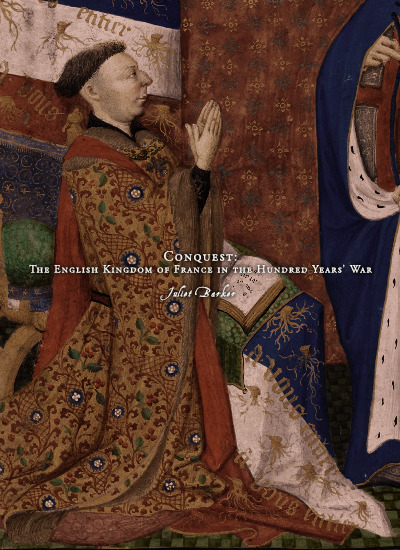
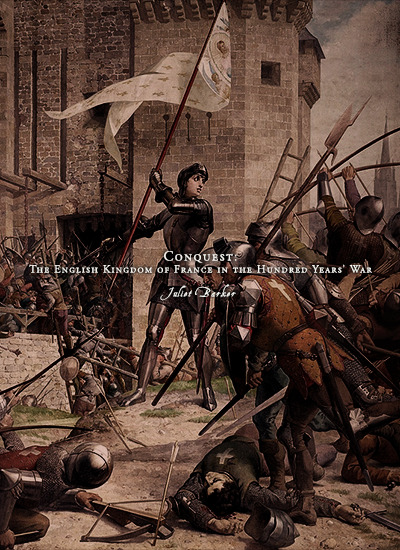
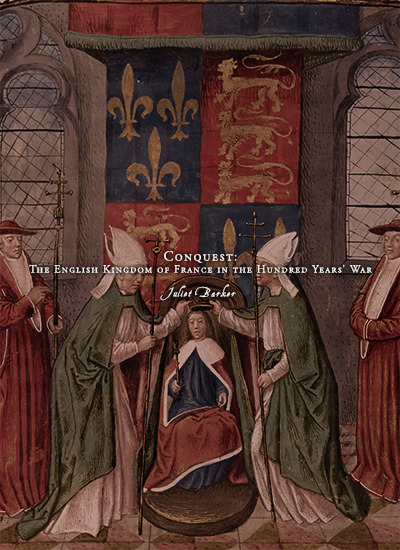
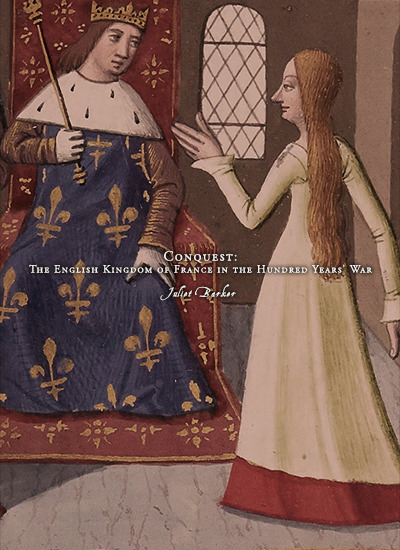
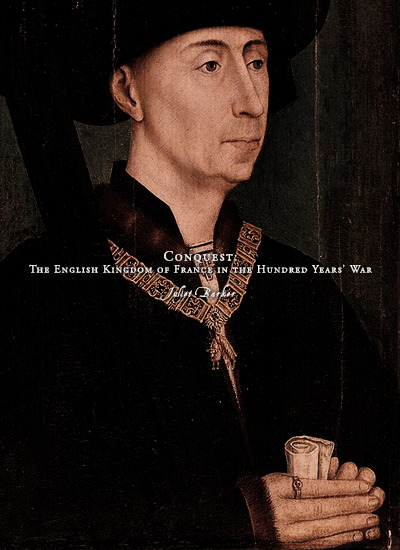
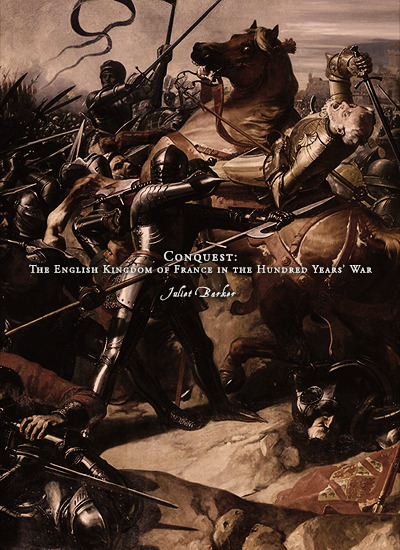
Favorite History Books || Conquest: The English Kingdom of France in the Hundred Years’ War by Juliet Barker ★★★☆☆
The Hundred Years’ War is defined in the popular imagination by its great battles. The roll-call of spectacular English victories over the French is a source of literary celebration and national pride and even those who know little or nothing about the period or context can usually recall the name of at least one of the most famous trilogy – Crécy, Poitiers, Agincourt. It is curious therefore that an even greater achievement has been virtually wiped from folk memory. Few people today know that for more than thirty years there was an English kingdom of France. Quite distinct from English Gascony, which had belonged to the kings of England by right of inheritance since the marriage of Eleanor of Aquitaine and Henry II in 1152, the English kingdom was acquired by conquest and was the creation of Henry V.
When he landed a great English army on the beaches of Normandy at the beginning of August 1417 Henry opened up an entirely new phase in the Hundred Years’ War. Never before had an English monarch invaded France with such ambitious plans: nothing less than the wholesale conquest and permanent annexation of Normandy. Yet, after he had achieved this in the space of just two years, the opportunity presented itself to secure a prize to which even his most illustrious ancestor, Edward III, could only aspire: the crown of France itself. On 21 May 1420 Charles VI of France formally betrothed Henry V of England to his daughter and recognised him as his heir and regent of France. In doing so he disinherited his own son and committed both countries to decades of warfare.
By a cruel twist of fate, Henry died just seven weeks before his father-in-law, so it was not the victor of Agincourt but his nine-month- old son, another and much lesser Henry, who became the first (and last) English king of France. Until he came of age and could rule in person, the task of defending his French realm fell to his father’s right-hand men. First and foremost among these was his brother John, duke of Bedford, a committed Francophile who made his home in France and for thirteen years ruled as regent on his nephew’s behalf. His determination to do justice to all, to rise above political faction and, most important of all, to protect the realm by a slow but steady expansion of its borders meant that, at its height, the English kingdom of France extended from the coast of Normandy almost down to the banks of the Loire: to the west it was bounded by Brittany, to the east by the Burgundian dominions, both of which, nominally at least, owed allegiance to the boy-king.
Bedford’s great victory at Verneuil in 1424 seemed to have secured the future of the realm – until the unexpected arrival on the scene of an illiterate seventeen-year-old village girl from the marches of Lorraine who believed she was sent by God to raise the English siege of Orléans, crown the disinherited dauphin as true king of France and drive the English out of his realm. The story of Jehanne d’Arc – better known to the English-speaking world today as Joan of Arc – is perhaps the most enduringly famous of the entire Hundred Years’ War. The fact that, against all the odds, she achieved two of her three aims in her brief career has raised her to iconic status, but it is the manner of her death, burned at the stake in Rouen by the English administration, which has brought her the crown of martyrdom and literally made her a saint in the Roman Catholic calendar. The terrible irony is that Jehanne’s dazzling achievements obscure the fact that they were of little long-term consequence: a ten-year-old Henry VI was crowned king of France just six months after her death and his kingdom endured for another twenty years.
Of far more consequence to the prosperity and longevity of the English kingdom of France was the defection of the ally who had made its existence possible. Philippe, duke of Burgundy, made his peace with Charles VII in 1435, just days after the death of Bedford. In the wake of the Treaty of Arras much of the English kingdom, including its capital, Paris, was swept away by the reunited and resurgent French but the reconquest stalled in the face of dogged resistance from Normandy and brilliant tactical military leadership from the “English Achilles”, John Talbot. For almost a decade it would be a war of attrition between the two ancient enemies, gains by each side compensating for their losses elsewhere, but no decisive actions tipping the balance of power.
Nevertheless, the years of unremitting warfare had their cost, imposing an unsustainable financial burden on England and Normandy, draining both realms of valuable resources, including men of the calibre of the earls of Salisbury and Arundel, who were both killed in action, and devastating the countryside and economy of northern France. The demands for peace became more urgent and increasingly voluble, though it was not until Henry VI came of age that anyone in England had the undisputed authority to make the concessions necessary to achieve a settlement.
The Truce of Tours, purchased by Henry’s marriage to Marguerite of Anjou, the infamous ‘she-wolf of France’, proved to be a disaster for the English. In his determination to procure peace at any price, the foolish young king secretly agreed to give up a substantial part of his inheritance: the county of Maine would return to French hands without compensation for its English settlers who had spent their lives in its defence.
Worse was to follow, for while the English took advantage of the truce to demobilise and cut taxes, Charles VII used it to rearm and reorganise his armies so that, when he found the excuse he needed to declare that the English had broken its terms, he was ready and able to invade with such overwhelming force that he swept all before him. The English kingdom of France which, against the odds, had survived for three decades, was crushed in just twelve months.
#historyedit#litedit#hundred years' war#medieval#english history#french history#european history#history#history books#nanshe's graphics
28 notes
·
View notes
Photo

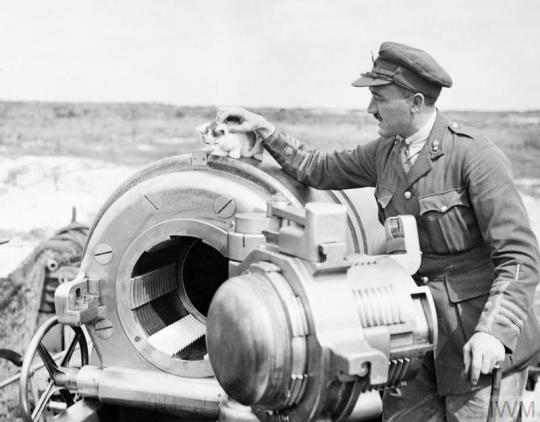
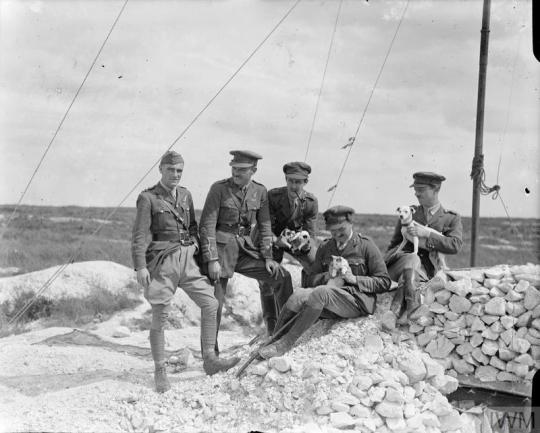
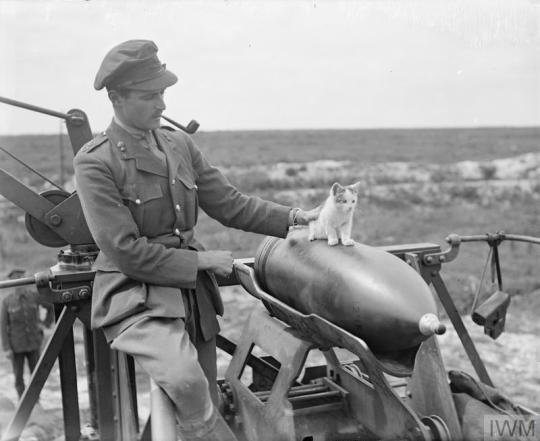
Jul 19 1918 #OTD Near Arras, France war photographer John Warwick Brooke took these photos of 444th Siege Battery, Royal Garrison Artillery officers playing with animals outside their dugouts. The weapon is probably a 12-inch Howitzer Mark V that fired shells that weighed 750 lb (340 kg).
IWM Q 6860, IWM Q 6863, IWM Q 6873
19 July 1918-07-19
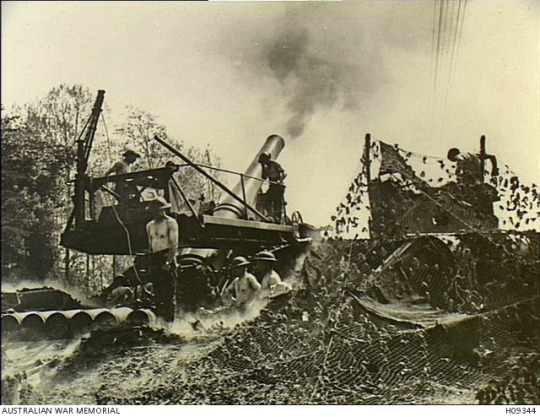
AWM H09344
43 notes
·
View notes
Note
I'm not going to go on anon because I am on mobile (and you would know it's me lbh), but I remember you mentioning that there are several things you would do if you were to stage your own ideal Cyrano production - so, let's say you're a director and have everything at your disposal: what would they be? (If not all, then top five!)
Oh, boy, where would I even begin... yeah, I’m gonna have to narrow this down to a top five.
I would lean just as far into the OT3/mirroring aspect as the Martin Crimp production. And not just for shipping purposes--there are such exquisite and subtle parallels between all three of the main characters (Roxanne and Cyrano’s nonconformity, Christian and Roxanne’s struggle to be seen as more than just pretty faces, Cyrano and Christian’s fundamentally selfless natures that are sometimes tested) that it would be a crime not to lean into them. And as sort of a one-and-a-half, I’m definitely including a kiss for Cyrano and Christian right before Christian goes off to die.
I would stress that the actors playing Christian and Roxanne have to be just as vivid and memorable as the actor playing Cyrano. I want to see Christian’s genuine charm and courage and spot-on intuition that suggests he’s pretty darn clever himself. I want to see Roxanne full of the same flash and fire and spirit of individuality as Cyrano that makes it totally believable that she would cross a warzone just to see her husband. So many productions sell those two short, which is really unfair.
I would also cast someone... more age-appropriate as Cyrano. It makes sense for him to be a few years older than Roxanne and Christian, but so many productions cast him as much older, which is just wrong.
I would make it a very colorful show, both in the sets and costumes--think of something between the 2008 Broadway production and the 2018 Teatro Eliseo production. Cyrano would be costumed much more simply than everyone else, of course, but he would still have the right amount of panache. Most of the color would be seeped out during Act Four, showcasing the despair of the Siege of Arras, but it would slowly start to come back in--at least a little of it--during Act Five.
I would probably use the Hooker translation. Maybe I’m biased because that was the first one I read, but I think it still holds up extremely well and is a little more lyrical than the Burgess while still being understandable. Also, everyone uses the Burgess translation now, and I want to shake things up a bit.
#There's just *so much* I would include but I have no talent for directing... XD#I would just want to make it a rich full emotionally involving experience for the audience and make them see what we do in the play.#asked and answered#ride-a-dromedary#cyrano de bergerac#Honestly I could make a list of things I would either keep or get rid of from every production I've seen so far. XD
12 notes
·
View notes
Text
ALESSANDRO FARNESE
Duke of Parma
(born 1545 - died 1592)
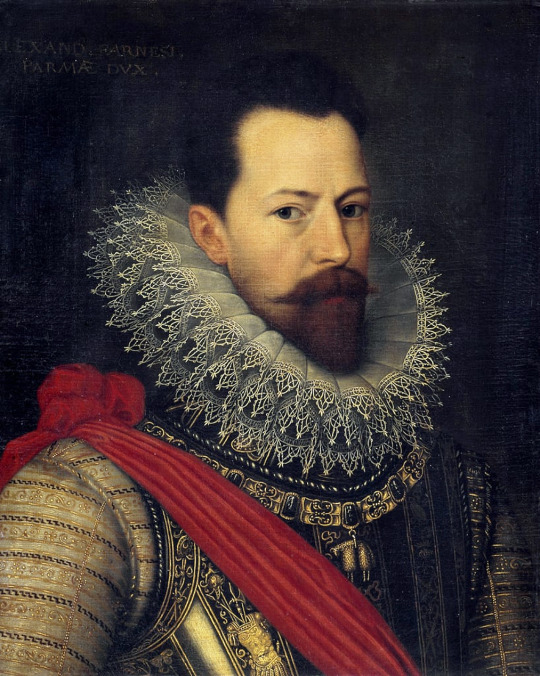
pictured above is a portrait of the Hereditary Prince of Parma, by Otto van Veen from c. 1585
-------------------- ~ -------------------- ~ --------------------
SERIES - On this day August Edition: Alessandro was born on 27 August 1545.
-------------------- ~ -------------------- ~ --------------------
ALESSANDRO was born in 1545, in Rome. He was one of the twins of Ottavio Farnese and Marguerite of Austria. His twin brother Carlo, died young.
Being an illegitimate great-grandson of Pope Paulus III he was a member of the HOUSE OF FARNESE and he was born during his tenure as Bishop of Rome.
Around the time of his birth the Pope gave his grandfather Pier Luigi the Duchies of Parma and Piacenza through a Papal bull. However his grandfather died only two years later leaving the Duchies to his father, who became Ottavio, Duke of Parma and Piacenza. This made him the HEREDITARY PRINCE OF PARMA, a title that he may or may not have used.
In the 1550s his life changed forever as his illegitimate maternal grandfather Karl V, Holy Roman Emperor (also Carlos I, King of Spain) abdicated leaving the Low Countries to his uncle Felipe II, King of Spain.
His uncle appointed his mother as Governor of the Netherlands in 1559 and he was sent to be raised in the Spanish Court, where he grew up with his cousin Carlos, Prince of Asturias (the King's son) and their uncle Don Juan of Austria (another illegitimate son of Emperor Karl V), as the three were about the same age.
By the end of 1565 he was married to MARIA, and Infanta of Portugal, the eldest daughter of Duarte, 4th Duke of Guimarães and Isabel of Braganza. They lived in Parma and had three children.
After his wife's death in 1577 he was invited to join his uncle Don Juan, the new Governor of the Netherlands in the Low Countries.
His carreer as a great General and negotiator in the many battles fought between Spain and the people of the Low Countries contributed to his own appointment as GOVERNOR OF THE NETHERLANDS in 1578, after his uncle's death.
When his father died in 1586 his uncle the Spanish King did not allow him to return to Parma to assume his role as DUKE OF PARMA AND PIACENZA, so he had to appoint his son Ranuccio as Regent of the Duchies. And as a consequence he would never return to Parma.
During the Spanish Armada attempt to invade England in 1558, he was the General supposed to cross the Channel from the Netherlands, but do to failed communications he and his man never arrived. An episode that led to the English victory and the destruction of the Armada.
The last years of his life were spent in France, fighting against the Huguenots for the Catholic cause by orders of his uncle the Spanish King. There he helped to relieve the Siege of Paris in 1590.
He was wounded at the Siege of Caudebec two years later after which his health decreased. And by the end of 1592 he died in Arras in the Spanish Netherlands (now part of France).
-------------------- ~ -------------------- ~ --------------------
ALESANDRO and his wife MARIA had three children…
Princess Margherita (Farnese) of Parma - wife of Vincenzo I Gonzaga, Duke of Mantua;
Ranuccio I Farnese, Duke of Parma - husband of Margherita Aldobrandini; and
Prince Odoardo (Farnese) of Parma - a cardinal.
-------------------- ~ -------------------- ~ --------------------
Check my post about ALESSANDRO's wife!
His wife was Maria, an Infanta of Portugal from her birth in 1538.
#alessandro farnese#duke of parma#duke of piacenza#house of farnese#farnese#italian royals#italian royalty#royals#royalty#monarchy#monarchies#royal history#italian history#european history#world history#history#history lover#16th century#charles v#philip ii#netherlands#spanish armada#history with laura
2 notes
·
View notes
Photo

The Great Sieges of History by William Robson
https://www.gutenberg.org/ebooks/59093
AuthorRobson, William, 1785-1863
IllustratorGilbert, John, 1817-1897
TitleThe Great Sieges of History
ContentsBactra -- Aï -- Thebes, in Bœotia -- Thebes, Palestine -- Troy -- Jerusalem -- Samaria -- Rome -- Nineveh -- Azoth -- Tyre -- Sardis -- Babylon -- Corioli -- Veii -- Falerii -- Platææ -- Byblos -- Athens -- Syracuse -- Agrigentum -- Byzantium -- Rhodes -- Lyons -- Gaza -- Persepolis -- Lacedæmon -- Argos -- Messina -- Corinth -- Tarentum -- Tunis -- Carthagena -- Utica -- Abydos -- Cremona -- Carthage -- Toulouse -- Sinope -- Paris -- Rimini -- Marseilles -- Alexandria -- Palmyra -- Milan -- Tournai -- Orleans -- Pavia -- Ravenna -- Antioch -- Naples -- Edessa -- Kaibar -- Weinsberg -- Damascus -- Lisbon -- St. Jean d'Acre -- Dover -- Bagdad -- Cassel -- Romorantin -- La Rochelle -- Cassovia -- Troyes -- Belgrade -- Castillon -- Liége -- Beauvais -- Grenada -- Vienna -- Algiers -- Valenciennes -- Leyden -- Livron -- Cahors -- Mæestricht -- Antwerp -- Malta -- Vachtendonck -- Ostend -- Bergen-op-Zoom -- Magdeburg -- Turin -- Arras -- Verchères -- Stralsund -- Frederikshall -- Schweidnitz -- Ismaïl -- Bommel -- Barcelona -- Gibraltar -- Seringapatam -- Saragossa -- Badajos -- Constantinople -- Ciudad Rodrigo -- Castle of Burgos -- St. Sebastian -- Sebastopol.
LanguageEnglish
LoC ClassD: History: General and Eastern Hemisphere
Subject: Sieges
CategoryText
EBook-No.59093
Release DateMar 19, 2019
Copyright StatusPublic domain in the USA.
2 notes
·
View notes
Photo
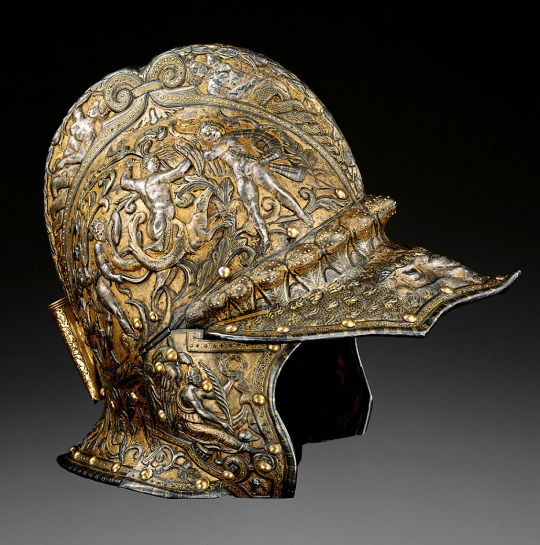
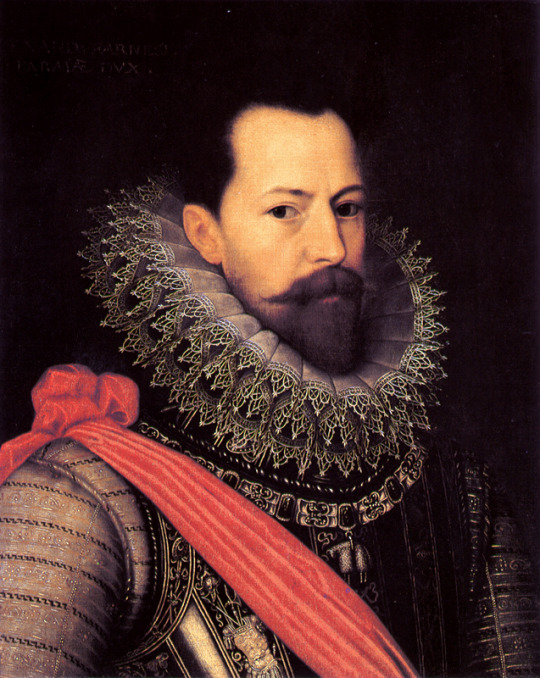
⚜️ Burgonet, ca. 1580
The helmet belonged to the headset for the rider and horse, which did not survive. Only separate details have survived to this day.
Owner: Alessandro Farnese, Duke of Parma and Piacenza (1545-1592)
Crafted by Lucio Piccinino of Milan (Italian, active 1575-1595)
🏛 The Kunsthistorisches Museum
🖼 Portrait of Alexander Farnese, Duke of Parma (1545-1592)
Artist: Otto van Veen (1556–1629)
Facts about Alessandro Farnese:
▪️ He was the son of the Duke of Parma and grandson of King Charles V of Spain.
▪️ He was educated at the Spanish court and he became a military general, fighting in campaigns against the Turks, French and English.
▪️ He fought with distinction at the Battle of Lepanto in 1571.
▪️ He was sent to France in 1590 to command the Spanish Army against Henry IV. His forces successfully relieved the siege of Paris (1590) and Rouen (1592) where he was wounded.
▪️ On 20 April 1592 at Rouen, he was wounded in the hand during the Siege of Caudebec whilst trapped by Henry's army. Having escaped from there he withdrew into Flanders.
▪️ He died in Arras on 3 December 1592, aged 47.
▪️ He was interred in the Church of Santa Maria della Steccata in Parma.
▪️ In January 2020, the Duke remains have been exhumed in a bid to clarify the circumstances of his death.
📝 Farnese died at the age of 47 in 1592 and there have long been suspicions that he did not die of natural causes but was poisoned.
So his body and that of his wife, Mary of Portugal, have been exhumed from Parma's Santa Maria della Steccata church and are set to be subjected to an autopsy by pathologists at the city's Maggiore Hospital. "Alessandro Farnese was a key man for Philip II of Spain, who won a series of historic battles," Anna Zaniboni Mattioli, the history enthusiast behind the initiative along with the writer Giuseppe Bertini with the support of the Costantiniano military order, told La Gazzetta di Parma.
"He became one of the most problematic men in Europe.
"When he died it was thought that he was suffering from pneumonia, but there's a suspicion that he may have been poisoned because of the envy he stirred."
Source: https://www.ansa.it/english/news/2020/01/22/dukes-body-exhumed-in-bid-to-solve-400-yr-old-cold-case_f7f73891-2690-47bc-b275-b777c0800f00.html
- -
⚜️ Бургиньот, Милан, около 1580 г.
Шлем из гарнитура для всадника и лошади, который не сохранился. До наших дней дошли лишь отдельные детали.
Владелец: Алессандро Фарнезе, герцог Пармы и Пьяченцы (1545-1592)
Оружейник: Лучио Пиччинино (итальянец, работал с 1575 по 1595 гг.)
🏛 The Kunsthistorisches Museum
🖼 Портрет Александра Фарнезе (1545-1592)
Художник: Отто ван Веен (Otto van Veen, 1556-1629)
Факты об Алессандро Фарнезе:
▪️ Он был сыном герцога Пармского и внуком Карла V, короля Испании.
▪️ Алессандро получил образование при испанском дворе и стал военным гене��алом, сражаясь в кампаниях против турок, французов и англичан.
▪️ В 1571 году Фарнезе принял участие в боевых действиях Священной лиги против турок, отлично проявив себя в морской битве при Лепанто.
▪️ в 1590 году Алессандро Фарнезе был послан во Францию, чтобы командовать испанской армией против Генриха IV. Его войска успешно сняли осаду Парижа (1590) и Руана (1592), где он был ранен.
▪️ 20 апреля 1592 года в Руане Фарнезе был ранен в руку во время осады Кодебека, когда армия Генриха захватила его в плен. Сбежав, он уехал во Фландрию.
▪️ Фарнезе умер в Аррасе 3 декабря 1592 года в возрасте 47 лет.
▪️ Он был похоронен в церкви Санта-Мария-делла-Стекката в Парме.
▪️ В январе 2020 года останки герцога были эксгумированы, чтобы выяснить обстоятельства его смерти.
📝 Фарнезе умер в возрасте 47 лет в 1592 году, и долгое время существовали подозрения, что его отравили.
Его тело и тело его жены, Марии Португальской, были эксгумированы из гробницы в церкви Санта-Мария-делла-Стакката в Парме и переданы на вскрытие патологоанатомам в городской больнице Маджоре. "Алессандро Фарнезе был ключевым человеком для Филиппа II Испанского, который выиграл серию исторических сражений", - прокомментировала Anna Zaniboni Mattioli.
"Он стал одним из самых проблемных людей в Европе."
"Когда он умер, многие предполагали, что у него развилось воспаление легких, но есть подозрение, что его отравили завистники."
Источник: https://www.ansa.it/english/news/2020/01/22/dukes-body-exhumed-in-bid-to-solve-400-yr-old-cold-case_f7f73891-2690-47bc-b275-b777c0800f00.html
8 notes
·
View notes
Text
Lost Souls Wandering
“I have a theory that all artists are lost souls wandering their way back to Paris” -- Atticus.
Heh, I think I’m clever. Arras is won by the French, and we spend a final night in Arras with our characters. This is where my and @theimpossiblescheme‘s AU canon’s diverge a bit, but PLEASE go read Yesterday, Tomorrow, and Today.
In which there is revelry, Roxane finds her way, and an unexpected ally appears:
To give credit where credit is due, the Gascony cadets do nothing by halves. They marched to war with grins, accepted death with a proud upward tilt of their chins, and now they celebrate their victory and toast their lost comrades with songs and wine and drunken dancing. De Guiche has already issued the news that they are to return to Paris in the morning, and the Spanish had retreated far enough that no fear of an ambush could worry them.
Roxane is enthralled by the raucous ongoings of the camp around her; she has been toasted as a goddess of war by nearly all of the men able to stand and walk over to her — and a few more besides — her hand kissed to tingling, and her cheeks near-cramped from smiling. Even so, none of the joy echoing around her can match the comparatively quiet delight that has brightened Cyrano’s adamantine blue eyes to the most saturated of azures. Like chips of lapis-lazuli set within his smile-creased face, Roxane finds herself admiring their gem-like glint from her place seated at his side. Occasionally, he catches her scrutiny, his grin widens, and it takes every willful bone in her body to refrain from leaning over to kiss him again.
Their fire is set a little away from the epicenter of merriment, a quieter refuge for the senior cadets — Cyrano and Le Bret — herself, and De Guiche. A singed hat marks the space in between she and the Comte, its bright peacock plumage marking it as the late Captain Castel-Jaloux’s; he would have joined their circle had he survived.
Roxane is surprised at De Guiche’s presence; by her observation, between his decision to remain with the Gascons during the Spanish assault and the valiant fighting he must have done in the battle, the Comte had discarded his haughty arrogance, replacing it with a small, warm smile and the resigned chagrin of a man who has earned — not purchased — genuine respect from those who do not give it lightly. Cyrano’s distaste for De Guiche has similarly bled into a cool detente since the end of the fighting. To Roxane it is fascinating to see the two, previously so at-odds, sitting with only the pleasant crackling of the fire between them.
Le Bret shifts in his seat, and Roxane hears the crack of his bones across the flames.
Cyrano chuckles. “You are getting old, my friend.”
“Hush.” Le Bret punches him none-too-lightly in his uninjured arm. “Your mouth threatens to be as big as your other appendage.”
Any other man who would make such an implication as Le Bret would have had his guts ribboned on Cyrano’s blade, but the older cadet — and Cyrano’s oldest friend, besides Roxane herself — seems blessed with a rare leeway. Cyrano laughs, takes the blow with remarkable good humor, and helps Le Bret to his feet when the latter announces his goal to obtain more wine before the rest of the company drinks it all. He limps away, favoring his good leg heavily. Cyrano returns to his place just out of Roxane’s reach.
De Guiche, who had stiffened upon the reference to Cyrano’s nose — no doubt remembering his unfortunate companion Valvert’s encounter with the aforementioned feature — relaxes once more, but only for a moment. Something piques his scrutiny; curiosity shifting in his dark gaze. His eyes sweep around the fire, marking the carefully maintained space between Cyrano and Roxane, and the riotous celebrations happening around them. His brows draw together and his eyes narrow further the longer he looks about. Roxane does not know what he is searching for, until De Guiche’s gaze once more returns to flicker between she and Cyrano and the empty space to her right.
Christian, after escorting her to the physician’s tent and confessing the details of his and Cyrano’s ruse, had not been beside her for even a passing moment. He had been gone, off to find the wounded and identify the dead, when Roxane and Cyrano had reentered the world following the revelation of their feelings for each other. He and Cyrano had exchanged words out of her hearing, and parted amicably, but Cyrano has not seen fit to relay the details of his sentiments yet. Roxanne knows he is safe — she had seen him moving about the camp, stumbling between a few other men nought an hour ago — but to be a man’s wife and not be beside him is strange and anomalous. Too strange. Too anomalous.
De Guiche’s slitted eyes fall on her. His look is careful, not triumphant; he is not a man who has just discovered a way to undo the woman who spurned him, nor does he look at her like she is the rack upon which he will torture Cyrano. Roxane, worryingly, does not know what to expect.
The Comte motions an idle hand to the space of their campfire. “Madame...I would have expected your husband not to leave your side...” He does not phrase it as a question, and his gaze flickers deliberately to de Bergerac.
Cyrano, while not privy to the progression of De Guiche’s earlier piecing-together, does not miss the expectant and realizing tone of the Comte’s query. He bristles from his casual slouch with such violent quickness Roxane’s immediate, half-conscious instinct is to reach out and seize his hand where it rests on the log between them to prevent him from doing anything irreparably rash in her defense. She knows she all but gives the change between them away by doing so; for all that she was affectionate with him before, there is a weight to her motion, an honesty of the love she feels for him that she is sure sounds in the air like a bell. More damningly, Cyrano stills at her touch; the enormity of his regard, to stifle his ferociousness at her silent behest, is not lost on Roxane either.
The Comte, ever one for self-preservation, recognizes Cyrano’s murderous intent for what it is. He pales and lifts his hands appeasingly despite his vastly superior tactical position;. “Peace, de Bergerac. I mean neither you nor Roxane any harm.”
Cyrano sneers like he did at the Theatre de Bourgogne. It is an unpleasant baring of teeth. The detente is shattered, and Roxane fears that he will cut himself on the pieces. “You blithely ordered us to our deaths earlier this eve. Forgive me if I am disinclined to take you at your word.”
Many a more battle-tried man has cowered in the face of Cyrano’s particularly fearsome growling; to Roxane’s surprise, De Guiche pulls his shoulders back and continues in a mild, unthreatening tone. he could ruin them both with a few words. Half a day ago, he would not have hesitated, but now he speaks reasonably. “As I said before we all nearly perished in this godforsaken mud, I shan’t leave a lady undefended.”
Cyrano bristles further; his scoff of derision is loud and rough. To Roxane, it is clear that he takes umbrage at the insinuation he would not be defense enough for her. The Comte intuits the same; pointedly, he looks to where Roxane still grips Cyrano’s hand. “It is her husband’s place to defend her, not yours, de Bergerac.”
Cyrano flinches when he hadn’t under the slap of Valvert’s glove. De Guiche’s unsubtle rejoinder strikes true, and Roxane is too slow to anchor Cyrano’s hand in hers before he pales and withdraws it.
De Guiche observes the interaction with interest, wisely tempered by caution. “Despite you both having duped me, I do still possess the power of sight; you have been exchanging glances I can only describe as love-struck since the end of the battle. Christian has avoided keeping company with either of you, his ostensible wife and his closest friend. What has transpired?”
Cyrano, unexpectedly cowed, is silent and still. Roxane, all at once, is inconsolably furious — she cannot stand seeing her love so off-kilter, cannot stand De Guiche’s presumptuous inquiry, cannot stand that Christian had not thought to maintain the ruse, and that she was such a fool. A breath; she fashions her anger into a mental blade like the one she’d carried during the siege and turns it on De Guiche.
“You have never been deserving of my secrets, monsieur. You are too bold to ask for them so soon after attempting to ruin my happiness.”
De Guiche concedes with graceful shame. “You are not wrong, I am not too proud to say. As for why I ask...” he hesitates, shifting to include Cyrano in his address, “I am also not too proud to admit my life was in your hands today, de Bergerac, and I find it returned, and myself the debtor.” He gestures aimlessly, “I wish to help the both of you.”
“You assume we need it.” The guttural notes of Cyrano’s ire have faded, but there is still an edge, and his eyes are a sharp, wary blue. Roxane nearly looks to the heavens at the impetuous nerve of him, so bold as to be brash. God, she loves him, and yet she wants to shake him by his ash-smudged collar. She feels De Guiche’s gaze fall solely on her, and she sighs her acknowledgement that his point has merit.
“You might.” The Comte mutters softly. “You cannot fight all of Parisian high society, nor stop the insidious talk with the force of your wit. Worse still, you are not the vulnerable one.”
It is Roxane’s turn to take umbrage, and this time she does not intend to give it back. “Do not presume to tell me my own weaknesses, Comte. I am all too aware of my position as a prize to be won, irrevocably tarnished the moment I capitulate. You not so long ago cajoled, begged, nearly forced your infatuation upon me. The Cadets were sent to war because of your sour vindictiveness upon falling short in your pursuit.” She nearly snarls in her fury, but she sighs it away, “Loathe as I am to admit it, you are not nearly the worst carrion gossip who would feed on the corpse of my good reputation.” She waves an airy hand at De Guiche, whose gaze had fallen to his boots at her mention of his campaign to bed her — At the same moment, Cyrano’s gaze had glinted dangerously silver — and De Guiche’s conscience-stricken features rise level with Roxane’s once more. She prompts him, “Pray tell, how you might help, Comte.”
De Guiche hesitates. He seems to take her charge with utter seriousness. Roxane’s regard for his political mind rises, barely; De Guiche, at the very least, knows that if he makes any genuine attempt to tarnish her, Cyrano will kill him, son-in-law to the Cardinal or no.
For all that he is formidable, Cyrano would be hard-pressed to reach De Guiche before Roxane cut him down herself.
“I…” De Guiche clears his throat officiously. “How many know that you and Christian wed?”
Roxane laughs lowly, “The entire camp, seeing as I kissed him in front of all of them. Called him husband. Little did I know the man who’d inspired me to cross a war zone was Cyrano.”
De Guiche winces at the bitter irony in her tone, but Roxane can see that he is intrigued. “Forgive me if I pry: I do not have the fully story. I may be better equipped to manipulate the situation in your favor if I could…know how you came to be…so utterly in love.” He says the last quietly. Roxane is surprised to register hollow longing in the words, a wistfulness she did not expect from such a shrewd man as De Guiche. For all his wooing of her, she’d never expected him to treasure tender emotions past their usefulness in manipulation. She feels a smidge of regret for misjudging yet another person in her life, at least in that small way.
She looks to Cyrano; it is primarily his tale to tell. His eyes are shocking in their cerulean shade, and there is a vulnerability in them that, if abused, could tear him apart. For all that his body and soul is steeled, his heart, Roxane realizes, has always been fragile. She wishes she had known; she would have protected it better. Maybe then he wouldn’t be looking at her now with such trepidation, such too-shy hopefulness. His resolve solidifies. He tips his head to her, then to the ground. He huffs a fortifying breath, then begins.
De Guiche listens attentively as Cyrano relays their tale. He begins at the theatre, with the burst of joy at being seen. He glosses over the despair caused by Roxane’s desires, but then moves into the part of the story she does not know herself. Cyrano’s artful words illustrate the grand scheme to woo her, the melding of two men into one, an author of divine prose and sublime turns of phrase with the face of a Grecian hero. De Guiche frowns at Cyrano like he is seeing a different man in the cloak of a de Bergerac, nonplussed at the self-consciousness, the crippling doubt that stayed his words from ever leaving the pages signed by another’s name. Roxane cannot stop tears from falling down her face. She wipes them away before Cyrano can see.
She tells her part too. It takes less time, but its importance can’t be overlooked, as she describes Christian’s honesty and Cyrano’s admittance. Their ardent revelations to each other. Their lack of foresight, in terms of their reputations. She falters as her words run up to the present; Cyrano’s hilt-calloused hand enfolds both of hers where they rest in her lap. It soothes her to feel the strength in him.
When she looks up, De Guiche’s eyes have fallen to their joined hands. He looks moved. The way he subtly swipes a knuckle under his eyes speaks to it.
After a moment, he smiles. It is a surprisingly kind expression on such a saturnine countenance. “You are both…unspeakably lucky to have found each other.” His gaze darkens, “I will not jeopardize that. I swear on my…recently reclaimed honor…” He has the wherewithal to jest lightly at his own expense, and a line of tension across Cyrano’s shoulders relaxes by a fraction.
“Nothing is yet dire. I have some…influence in certain circles that could smooth this over.”
De Guiche explains a potential plan. It involves quietly annulling the oaths Roxane and Christian made to each other, and explaining to the Cadets the truth, up until the point where they were married, and skipping to the reveal that Christian had asked Cyrano to continue writing the letters. Cyrano takes that upon himself; the Cadets respect the sanctity of the Guard House like few other places, and if he swears them to secrecy there, they will keep it on pain of a solid, inescapable pummeling.
Roxane swears to speak to Christian; they still have words that need exchanging, if only to resolve any festering hurt and misunderstanding.
Then De Guiche continues unexpectedly. “When you arrange the wedding…I should like…I would offer to cover any expenses you incur, for the ceremony.” He wrings his hands; Roxane has never seen him squirm before now. “I can also be your official witness, and speak to the sanctity of the vows in society.”
It is a gracious offer. Cyrano’s formidable nose wrinkles with suspicion for the first time in hours. He says what Roxane is thinking, “Such favors usually accrue a cost. What do you want from us?”
“Nothing, truly.” De Guiche sighs when Cyrano’s eyes narrow to chips of sapphire. “I swear it. I meant it, before, when I said I owed you my life, Cyrano. I also owe you an apology, Madame de Robin, for my uncouth behavior before.” He bows shallowly from his seat.
Roxane feels something close to relief wash cool through her chest for the first time in days. She allows herself a small smile. “You are forgiven, Comte, but I expect an extraordinarily extravagant wedding present.”
“Of course.” De Guiche, gratifyingly, is pale with relief too. She wonders at her luck — her near misfortune — of causing a Comte, a cadet, and a veritable hero to be afraid of her. She would like to get used to it.
She thinks Cyrano’s awe enough as she looks to him again. Gently, as if seeing the force of her regard in her eyes, he takes her hand in both of his and kisses her knuckles. For all that Cyrano de Bergerac is a force of nature, he tempers her.
De Guiche clears his throat. “I… think I will follow Le Bret’s example.” It is an unsubtle escape to leave them alone. Roxane cares very little.
Despite how many details they must coordinate and futures they must discuss, neither she nor Cyrano speak. He shifts close enough for her to pillow her head on his shoulder, her arms folded through the crook of his, and they regard the fire and the brightening stars on their last night in Arras.
Paris, and a life together, awaits them.
#cyrano de bergerac#cyrano#roxane#christian (mentioned)#De Guiche#Le Bret#This is a bit rushed and I APOLOGIZE#I hope you like it#It's been a long time coming#Hope it lives up to the hype#I was inspired by the shocking character development you gave De Guiche so here's so more#romance#OOF It's almost 1AM what am I doing#being a writer and being waaaaayyy behind
5 notes
·
View notes
Text
sorry i saw the 2021 cyrano last night and i have opinions and i am sick so you're subject to them
cyrano (2021) had in its favor a beautiful soundtrack and lovely lyrical work that regularly rose to the occasion of trying to fill in some real big lyrical shoes. there was a lot of fun to be had in the middle of the movie and the dynamic between cyrano and christian was very nicely played out! dinklage rose to the occasion. frankly every actor did. i loved the take they had on roxane becoming so adoring she realized she had stopped wanting infatuation and actually craved intimacy, and christian's actor (plus a phenomenal song) DID make me cry during the siege of arras.
what i felt cyrano (2021) did NOT hold in its favor was usually outside of songwork; the writing not feeling like it could actually show its audience ableism onscreen, and to the detriment of the characterization of their title character.
i sorely missed several times cyrano would push into hilarious and over the top poetic dialogue! especially when cyrano illustrates the ways he SHOULD have been degraded because he couldn't stand a boring insult. especially in the valvert fight. the dialogue choices were clunky to me and i wanted the sheer audacity to intentionally, loudly turn the fight into a poem! and it kind of made me lose excitement it had been building up to.
now i had really been excited about dinklage cyrano because i really wanted to see the transfer from "big nosed poet who is otherwise perfectly able-bodied" into "a man with a legitimate grievance with society" and they largely... just did not deliver on that one. they make the mistake often of telling rather than showing the audience that cyrano is at a disadvantage or regularly given something to rage against that isn't his own ego. they did great showing us where he underestimates himself; they don't give us much in terms of others underestimating him. they nix most of the scenes where cyrano is insulted, and when they do show it they underdeliver with maybe a throwaway line. which is not. what i want to see? no, i don't want to see cyrano get like, subject to ableism torture porn or made into a Feel Good Story, but in the same breath it reduces a lot of his character to take away his anger, which is effectively what they did by removing a lot of the derogatory comments he was subject to in the original text in the name of not putting ableism onscreen. his response to the comments, of course, is to get angry, and by removing the provocation you remove a lot of his anger which only administers insults to both the play and the movie.
and that's the crux of it for me: they took a lot of his anger, which was in large part why i felt cyrano was so compelling as a tragic hero. his own temper and refusal to let a fight go plus his inability to be vulnerable with the woman he loves is what kills him in the end, body and soul, denying him the joy of coming out of his solitude long after his "competition" who wants him to get the girl is dead. (cyrano and christian gay moments. more on that in a different post.) and instead he dies of. a war wound? i think? an old war wound? he dies confessing his pride to roxane's lips when what i wanted was to see him bloodied and calling down his personal demons with his sword out!! i want the furious refusal to let go of his pride down to his last second with his panache clutched to his chest! hey where was his hat anyway
i am being Very negative in this but as a whole i did find it very fun and an inventive take on the original, i just wanted to ramble a bit about what i personally didn't enjoy about it lmao
5 notes
·
View notes